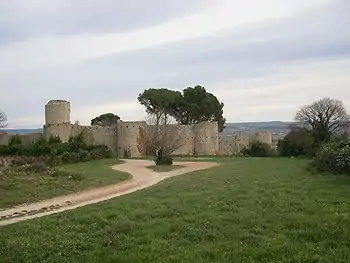Clermont-l'Hérault
Clermont-l'Hérault (Occitan: Clarmont d’Erau) is a commune in the Hérault department in southern France.
Clermont-l'Hérault | |
|---|---|
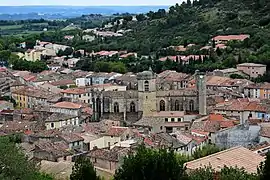 View of Clermont-l'Hérault's City centre | |
.svg.png.webp) Coat of arms | |
Location of Clermont-l'Hérault 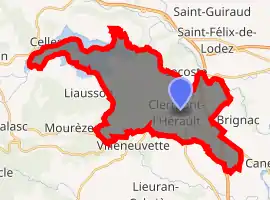
| |
 Clermont-l'Hérault 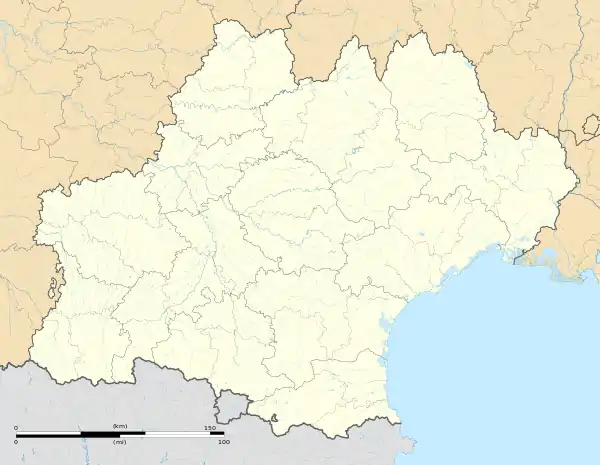 Clermont-l'Hérault | |
| Coordinates: 43°37′41″N 3°25′59″E | |
| Country | France |
| Region | Occitanie |
| Department | Hérault |
| Arrondissement | Lodève |
| Canton | Clermont-l'Hérault |
| Intercommunality | Clermontais |
| Government | |
| • Mayor (2014–2020) | Salvador Ruiz |
| Area 1 | 32.49 km2 (12.54 sq mi) |
| Population (2017-01-01)[1] | 8,852 |
| • Density | 270/km2 (710/sq mi) |
| Time zone | UTC+01:00 (CET) |
| • Summer (DST) | UTC+02:00 (CEST) |
| INSEE/Postal code | 34079 /34800 |
| Elevation | 40–322 m (131–1,056 ft) (avg. 92 m or 302 ft) |
| 1 French Land Register data, which excludes lakes, ponds, glaciers > 1 km2 (0.386 sq mi or 247 acres) and river estuaries. | |
Geography
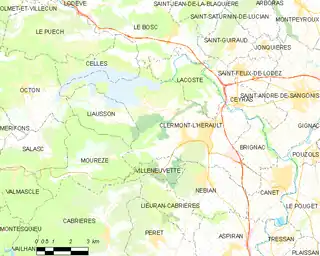
Chief town of Canton, Clermont-l'Hérault is located about 40 km west of Montpellier, halfway between the Mediterranean Sea to the south and the Cévennes National Park to the north.
Hydrography
La Lergue, Le Salagou, Ruisseau des Servières are the main rivers that cross the town.
Neighboring municipalities
Climate
The city enjoys a Mediterranean climate. The winter is mild despite the frosts that can sometimes occur. Summer is hot. In autumn, Mediterranean episodes occur with heavy rain showers.
History
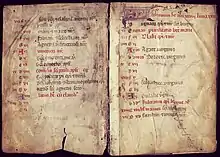
The town of Clermont-l'Hérault has been occupied since Protohistory: during the Iron Age (6th century BC), Clermont constitutes one of the main Oppidum of the Mediterranean Celtic.
Recent archaeological excavations have demonstrated its importance during antiquity (INRAP, 2000s). There was then a main agglomeration of five to six hectares and a peripheral inhabited area of 12 hectares. The remains of a thermal establishment have been uncovered.
The town was several times taken and retaken in the religious wars of the 16th century. The city was formerly known as Clermont-Lodève. Nearby, the manufacture of sheets Villeneuvette was created, or rather relaunched in 1667 by Colbert to develop the cloth industry in France, taking advantage of the waters of the Dourbie.
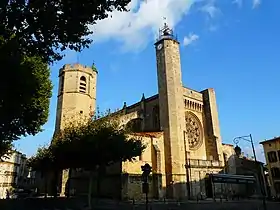
Politics and administration
| Election | Mayor | Party | Occupation | |
|---|---|---|---|---|
| 1971 | Marcel Vidal | PS | Winemaker Member of the Senate for Hérault | |
| 1977 | ||||
| 1983 | ||||
| 1989 | ||||
| 1995 | ||||
| 2001 | Alain Cazorla | PS | ||
| 2008 | ||||
| 2014 | Salvador Ruiz | DVG | Teacher | |
Population
|
|
Sights
The town is built on the slope of a hill ("Pioch Castel") which is crowned by an ancient castle (Château des Guilhem) and skirted by the Rhonel, a tributary of the Lergue. It has an interesting chapel "Les Pénitents"(Penitents) recently restored, built in southern Gothic style. It is now a cultural centre. Also of interest is Saint Paul's church, begun in the 12th century, and finished in the 14th century.
Close by is the large man-made Lac du Salagou.
See also
References
- "Populations légales 2017". INSEE. Retrieved 6 January 2020.
 This article incorporates text from a publication now in the public domain: Chisholm, Hugh, ed. (1911). "Clermont-l'Herault". Encyclopædia Britannica (11th ed.). Cambridge University Press.
This article incorporates text from a publication now in the public domain: Chisholm, Hugh, ed. (1911). "Clermont-l'Herault". Encyclopædia Britannica (11th ed.). Cambridge University Press.
External links
| Wikimedia Commons has media related to Clermont-l'Hérault. |

